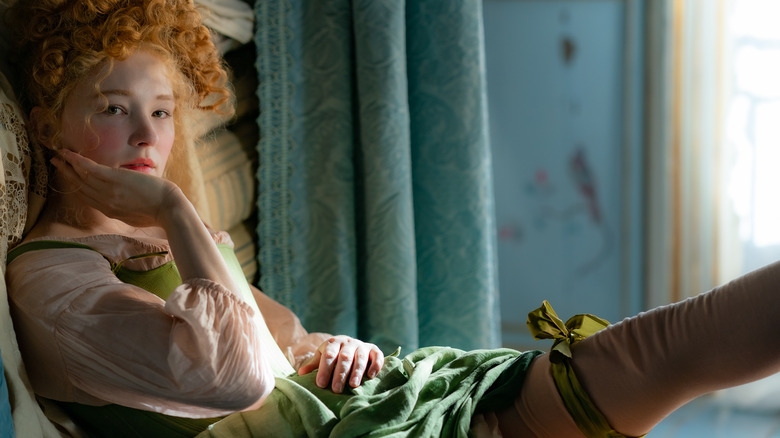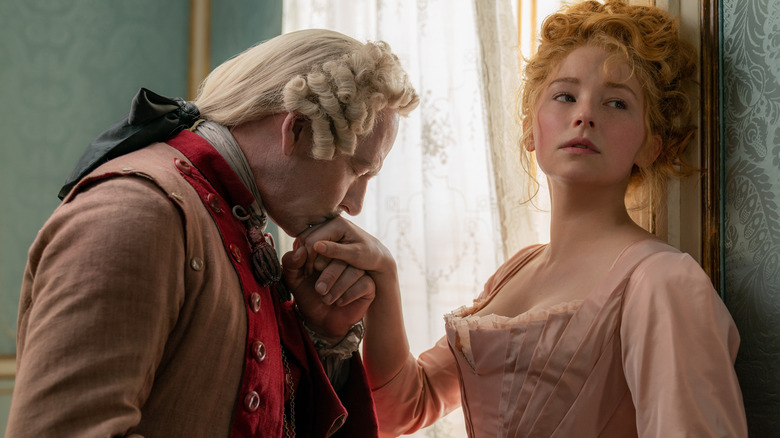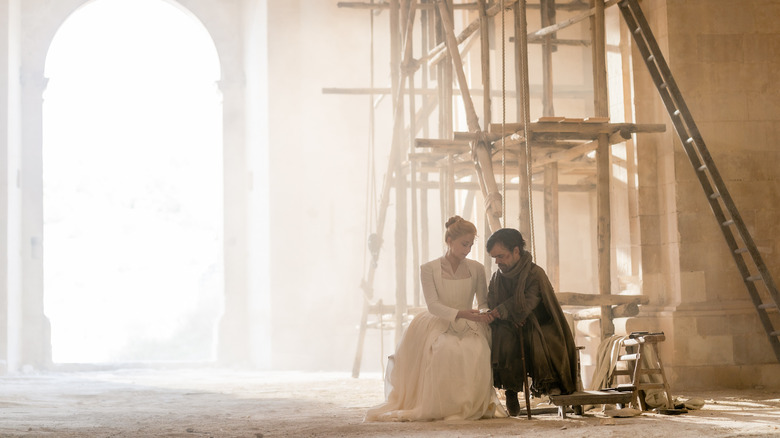Cyrano Star Haley Bennett Channeled Her Frustrations To Give Roxanne More Agency [Interview]
MGM's "Cyrano" tackles the daunting task of reinventing a classic. But instead of getting bogged down beneath various adaptations of Edmond Rostand's 1897 play, the movie challenges the previous iterations. This approach was especially important for Haley Bennett, who played the role of Roxanne.
Roxanne is the beautiful woman that Cyrano (Peter Dinklage) expects to spend his life pining for. Convinced that his appearance renders him unworthy of love, he refuses to declare his feelings. But appearances are deceiving, and these two are walking proof. Cyrano is brilliant: A poet, a romantic, and a remarkable swordsman. And though she's the kind of luminous beauty accepted by society, Roxanne has no interest in the things others seem to value: She prefers intelligence over money, and wants a great love rather than a comfortable life. In bringing her character to life, Bennett considered where past interpretations went wrong: "She felt a bit precious and was treated like a child. And I saw a woman who the patriarchy was judging and trying to fix and alter."
Bennett dubs Roxanne an "outsider in this insider's body," a person who appears to belong in high society but is too much of a free thinker to conform. Her take on Roxanne is refreshing, certainly when it comes to classic romantic leads — and this should come as no surprise, since Bennett has been playing the role for years now, including in the Erica Schmidt stage production on which this film is based. The actress has been shaping her version of Roxanne long before the film was in the works, and in a recent interview with /Film, she told us more about bringing Roxanne from stage to screen and what it takes to update a classic.
'I wanted to put forth was that it wasn't all love and flowers and poetry'
This interview has been lightly edited for clarity.
Can you start by telling me about your experience taking this character from stage to screen? To go from theater — which is thought of as this living, breathing, changing thing — what was it like to transform that for the film?
I had never done theater before, so that was a great experiment for me. And I'm so grateful to Pete and Erica for embracing my interpretation of Roxanne. I was also eight months pregnant by the end of that production, which also speaks to Erica and her support of women in all forms. It's funny because I've gotten a lot of questions about how it was to sing in a corset. And I said it had nothing on singing eight months pregnant. [laughs] There is no corset as constricting as pregnancy.
I really loved that experience and I was grateful for that experience. It felt like preparation for the film in a lot of ways. I don't think I've ever been so vulnerable as I was in certain parts of this film, except in real life, I guess. So it was a gift to emotionally strip ourselves down on stage every night, all those years ago. It created a real sense of intimacy between Pete and I. It's a very openhearted film. Every character is kind of hiding who they really are or their true feelings, so we really had to be careful and compassionate. But it also helps that Kelvin and Pete are so lovable and so funny and brought a lot of comic relief to the set.
Having spent so much time as Roxanne, from the workshops to the film, what was your way into her?
I've inhabited the character through so many stages of my life. As a single woman, desperate to do theater, and then as a woman on the verge of motherhood, and now, a mother and a partner. I felt that kind of love deepening. The film is so overwhelmingly romantic, but as an actor, I wanted to distinguish what that love was for me. And as an actor, I had greater substitution. It was about wanting to be seen and to connect with others in a more soulful way, not wanting to be an appendage to a man. It was about not wanting to be just a pretty face. It's about wanting to be appreciated for my unique creative abilities, and what's distinctive about me. It was about wanting to not feel invisible. I had a lot to relate to and express through Roxanne, a lot of anger and desperation and frustration.
In my preparation, I thought, "Wouldn't it be interesting if Roxanne is a woman that is too honest, uncensored, and blunt, and not so different from Cyrano? What if she's a woman who people try to censor?" I thought it would be interesting if she was a woman who has a history of misbehaving and rebelling and going against the grain. A woman that was anti-establishment and that people all around her are trying to alter and to fix. But [she] just wants to love who she wants and be an independent thinker. It was important to me that I create that, and that I do everything I can to make sure that was the story we were telling.
I feel like in past adaptations, I've seen Roxanne lack a certain power and agency. To me, the interpretation I wanted to put forth was that it wasn't all love and flowers and poetry. In the past, she felt a bit precious and was treated like a child. And I saw a woman who the patriarchy was judging and trying to fix and alter. I felt empathy towards Roxanne, who is constantly meant to adhere to the ways of patriarchy, but has this deep need to be a free thinker and of herself entirely and an independent woman, who's an author of not only her writing, but of her life. The film is set in a time where women had no ownership. They weren't encouraged to read or be free thinkers.
'I had a little problem with this idea that Roxanne didn't know about Cyrano's affection for her'
Like you said, these characters have been around for so long that they have these different iterations and perceptions — like the conversation around Christian being perceived as naive or dumb. And then this film delves into that being a misinterpretation of Christian.
I think we wanted to challenge all of the past interpretations of all of the characters. It was interesting. You know, I feel like all the characters are kind of in the wrong body. The fact that we took away the nose, it's meant to represent that we all have the nose — every single one of us has the nose. I think the film speaks to our insecurities, but it also speaks to bullies, and how people that are "other" are perceived by bullies and by bigotry, like what you see in the film and in regards to Peter's size. It really isn't about his size. It's about the depth of him not feeling worthy of love.
In terms of Kelvin, he's one of the most talented actors I've ever worked with. He's so vulnerable. And he transformed a role — so effortlessly — that is historically seen as unintelligent or stupid. He took the role on with such soulfulness and grace and elegance and beauty and innocence. He found the humor and what it's like becoming completely tongue-tied when you're facing the person that you love. I love that scene. It was my one of my favorite scenes to act in, at the poetry salon with Kelvin. I've so been in [Christian's] shoes just completely tongue-tied, not able to express my true feelings. He made that so relatable. You just feel like he's scared. You don't feel like he's dumb. If only he could express his true feelings — and I often feel that way about myself. If only I could express what I feel in my heart or what I can write down on paper in words. And I love how this film highlights the importance of words and language.
Having that personal connection to Roxanne and Christian, did you also feel that way about Cyrano's character?
Roxanne and Cyrano, I feel like they are cut from the same cloth and they're more alike than they are different. They're two characters that like to color outside of the lines. They're both rebellious. They go against the grain. They're both anti-establishment. I feel like Cyrano is someone that Roxanne can be completely authentic with. His friendship is comforting to her. She doesn't feel lonely when she's with him. He unlocks something within her. I think that's true love, when you can truly be yourself, and Cyrano unlocks that within her.
I had a little problem with this idea that Roxanne didn't know about Cyrano's affection for her. I thought it might be an interesting choice and something that I explored ... what if she knew? What would that say about her, and what would that say about the society they lived in? What would that say about her ultimately wanting to be loved by someone who had the courage to say, "I love you?" I felt like that would give her a bit more agency, so it's not 100% blatant. I think it's important for audiences to be able to have their own experience. We didn't make that black and white. There's definitely gray areas. I think if you watch the film more than once, you can see moments where, perhaps in that balcony scene, perhaps she wanted Cyrano to climb up that balcony. And when he didn't, she decides to love the man who will love her back. She's in a precarious situation, being that she's an orphan. If she were an heiress, life might have looked a lot different for her.
I love that approach. We have so many female romantic leads whose idea of romance is either looked down on or seen as naive. It's nice that the second we meet Roxanne, she immediately says something to the effect of, "I'm not a damsel in distress."
I saw Roxanne as this outsider in this insider's body, if that makes sense. She exists in a world of conformists and small-minded people, which is why I think the theater piece was such an important piece for Joe to highlight — people who are judgmental and who are not free thinkers. Whereas she and Cyrano are actually cut from the same cloth. She loves Cyrano because he is this colorful, magical, artistic, genuine, and kindhearted person. He colors outside the lines. He's messy and he isn't afraid to be different. And I think that Cyrano and his ideas excite and challenge Roxanne, whereas society and the patriarchal forces are what stifle and suffocate her.
But she still needs to find a means to an end because she's enslaved and she wants to be free. Christian and these experiences Roxanne has through these letters is that means to an end, it's her freedom. So to me, Christian represented freedom. He was the weight of the world off of her chest. And with Christian, it was easy and straightforward. She found the love and the freedom that she was seeking, through an incredibly beautiful man.
"Cyrano" opens in theaters on February 25, 2022.


